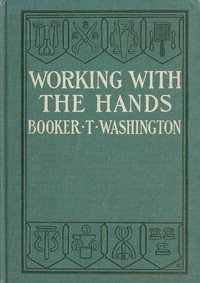Working With the Hands by Booker T. Washington
"Working With the Hands" by Booker T. Washington is a motivational work that emphasizes the importance of industrial training and manual labor, written in the early 20th century. The text primarily serves as a sequel to Washington's earlier autobiography, "Up from Slavery," showcasing his experiences and philosophies related to education and labor at the Tuskegee Institute. The book advocates for a balanced education that combines practical skills with moral and intellectual growth,
targeting not just the academic development but also the empowerment of individuals through hands-on work. The opening of the book presents Washington's reflections on the dignity of manual labor and its role in education, drawing from his own life experiences as a young boy and later as an educator. He recalls his early days after emancipation, highlighting the societal notions that equated education with a dismissal of physical work. Washington shares anecdotes, such as his experience living with a demanding employer who taught him the values of discipline and hard work. He emphasizes that true education should link mental and manual skills, ultimately aiming to uplift the African American community through practical training while fostering a sense of self-respect and personal achievement. (This is an automatically generated summary.)
Read or download for free
| How to read | Url | Size | |||
|---|---|---|---|---|---|
| Read now! | https://www.gutenberg.org/ebooks/64504.html.images | 401 kB | |||
| EPUB3 (E-readers incl. Send-to-Kindle) | https://www.gutenberg.org/ebooks/64504.epub3.images | 3.2 MB | |||
| EPUB (older E-readers) | https://www.gutenberg.org/ebooks/64504.epub.images | 3.2 MB | |||
| EPUB (no images, older E-readers) | https://www.gutenberg.org/ebooks/64504.epub.noimages | 199 kB | |||
| Kindle | https://www.gutenberg.org/ebooks/64504.kf8.images | 3.3 MB | |||
| older Kindles | https://www.gutenberg.org/ebooks/64504.kindle.images | 3.3 MB | |||
| Plain Text UTF-8 | https://www.gutenberg.org/ebooks/64504.txt.utf-8 | 359 kB | |||
| Download HTML (zip) | https://www.gutenberg.org/cache/epub/64504/pg64504-h.zip | 3.0 MB | |||
| There may be more files related to this item. | |||||
About this eBook
| Author | Washington, Booker T., 1856-1915 |
|---|---|
| Photographer | Johnston, Frances Benjamin, 1864-1952 |
| LoC No. | 04012107 |
| Title |
Working With the Hands Being a Sequel to "Up from Slavery," Covering the Author's Experiences in Industrial Training at Tuskegee |
| Note | Wikipedia page about this book: en.wikipedia.org/wiki/Working_with_the_Hands |
| Contents | Moral values of hand work -- Training for conditions -- A battle against prejudice -- Making education pay its way -- Building up a system -- Welding theory and practice -- Head and hands together -- Lessons in home-making -- Outdoor work for women -- Helping the mothers -- The tillers of the ground -- Pleasure and profit of work in the soil -- On the experimental farm -- The eagerness for learning -- The value of small things -- Religious influences at Tuskegee -- Some tangible results -- Spreading the Tuskegee spirit -- Negro education not a failure. |
| Credits | Mary Glenn Krause, MFR, Martin Pettit and the Online Distributed Proofreading Team at www.pgdp.net (This file was produced from images generously made available by The Internet Archive/American Libraries.) |
| Reading Level | Reading ease score: 65.2 (8th & 9th grade). Neither easy nor difficult to read. |
| Language | English |
| LoC Class | E151: History: America: United States |
| Subject | Tuskegee Institute |
| Subject | Washington, Booker T., 1856-1915 |
| Category | Text |
| EBook-No. | 64504 |
| Release Date | Feb 8, 2021 |
| Most Recently Updated | Oct 18, 2024 |
| Copyright Status | Public domain in the USA. |
| Downloads | 421 downloads in the last 30 days. |
| Project Gutenberg eBooks are always free! | |

